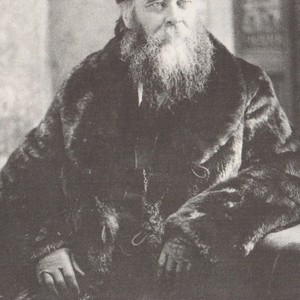
Source: Link
McCOLL, EBENEZER, schoolteacher and superintendent of Indian affairs; b. 13 Aug. 1835 in Aldborough Township, Upper Canada, eighth of the 11 children of Samuel McColl and Mary Leitch; m. 9 Sept. 1879 Ella Beebe in Middletown, N.Y., and they had two sons and six daughters; d. 30 Oct. 1902 in Winnipeg.
Ebenezer McColl was raised on the homestead his grandfather, father, and uncle had cleared when they arrived from Argyll, Scotland, in 1819. His mother had immigrated to Upper Canada from the same part of Scotland as a girl. The family belonged to the Covenanted Baptist Church of Christ (whose members were also known as Primitive Baptists or Old School Baptists) and McColl’s uncle, one of its pastors, greatly influenced his nephew.
McColl received an advanced education for the period. From local schools he went on in 1859 to the Fort Edward Institute, Fort Edward, N.Y., where he spent three terms and earned high praise for his industry and academic excellence. He then taught for two years in Elgin County, Upper Canada, before returning to studies in 1864, at the University of Michigan. Illness forced him to leave after six months, however, and on recovering he went back to teaching. He left in 1875 when he was hired by George Brown* as a field agent for his newspaper, the Toronto Globe.
In September 1877 McColl was named inspector of agencies and accounts for the Indian affairs branch of the Department of the Interior; he was to cover the Manitoba superintendency, which stretched from Lake Superior to Cumberland House (Sask.) and included over 3,000 natives. Less than three months later, on the recommendation of his superior, the minister of the interior, David Mills, McColl was appointed by Governor General Lord Dufferin [Blackwood] to a commission to investigate allegations of fraud in the office of the Indian affairs branch at Winnipeg. He and the other commissioner, lawyer W. H. Ross, began hearings on 18 December and after the inquiry had concluded, the acting superintendent, Joseph-Alfred-Norbert Provencher*, was removed from office.
As inspector, each spring McColl would travel to the reserves in his superintendency, voyaging hundreds of miles overland and by canoe. He thoroughly inspected all aspects of the reserves, including schools, crops, livestock, fishing equipment, living conditions and health of the residents, distribution of government supplies, and the accounts and records of the branch’s agents. On occasion, he was called on to settle disputes and hear complaints against the branch or its employees. At the end of each trip he would forward lengthy reports of his findings to Ottawa. A humorous man whose extensive correspondence with his family contains interesting accounts of his work and travels, he wrote in 1883, after having finished a 150-page report, that his clerk had developed a cramp in his hand while making a duplicate of it. “A mental affliction of a similar description will happen to those in Ottawa who will have the fool-hardiness to read it, not to speak of the fatal consequences of their attempting to criticize it.”
In 1890 McColl was named superintendent of Indian affairs for Manitoba and the North-West Territories. Conscientious and hard-working, he was esteemed by many whom he met during his travels. Horace Bélanger*, a chief factor in the Hudson’s Bay Company, was a close friend. Among the numerous native leaders who respected him were Chief Henry Prince of St Peter’s Indian Reserve and Chief William Berens of Berens River Indian Reserve, who many years later would comment that McColl was “the best inspector the Indians ever had since Treaty was signed.” Despite strokes suffered in 1890 and 1900, which made it difficult for him to write, McColl continued in office until his death in October 1902.
[This biography is based on my Ebenezer McColl, “Friend to the Indians,” superintendent of Indian affairs for Manitoba and Northwest Territories: a biography, 1835–1902 (Winnipeg, 1989), which provides a list of the principal sources consulted. f.mcc.]
Cite This Article
Frances McColl, “McCOLL, EBENEZER,” in Dictionary of Canadian Biography, vol. 13, University of Toronto/Université Laval, 2003–, accessed February 8, 2026, https://www.biographi.ca/en/bio/mccoll_ebenezer_13E.html.
The citation above shows the format for footnotes and endnotes according to the Chicago manual of style (16th edition). Information to be used in other citation formats:
| Permalink: | https://www.biographi.ca/en/bio/mccoll_ebenezer_13E.html |
| Author of Article: | Frances McColl |
| Title of Article: | McCOLL, EBENEZER |
| Publication Name: | Dictionary of Canadian Biography, vol. 13 |
| Publisher: | University of Toronto/Université Laval |
| Year of publication: | 1994 |
| Year of revision: | 1994 |
| Access Date: | February 8, 2026 |







